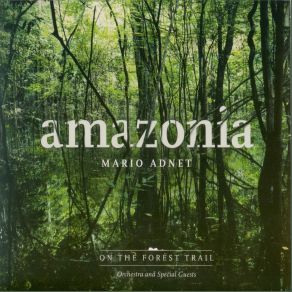Amazonia
Download links and information about Amazonia by Mario Adnet. This album was released in 2013 and it belongs to Jazz, World Music genres. It contains 12 tracks with total duration of 49:41 minutes.

|
|
|---|---|
| Artist: | Mario Adnet |
| Release date: | 2013 |
| Genre: | Jazz, World Music |
| Tracks: | 12 |
| Duration: | 49:41 |
| Buy it NOW at: | |
| Buy on iTunes $9.99 | |
| Buy on Amazon $8.99 | |
| Buy on Songswave €1.68 | |
Tracks
[Edit]| No. | Title | Length |
|---|---|---|
| 1. | Trilhas da Floresta | 6:19 |
| 2. | Borzeguim | 4:14 |
| 3. | Os Rios | 3:03 |
| 4. | A Rã | 4:14 |
| 5. | Boto | 4:57 |
| 6. | Rio Amazonas | 5:53 |
| 7. | Canoa Canoa | 4:18 |
| 8. | Prelúdio 17 | 2:15 |
| 9. | Saci | 3:29 |
| 10. | Uirapurú | 3:40 |
| 11. | Amazonas Ii | 3:49 |
| 12. | Saudades das Selvas Brasileiras: Ii. | 3:30 |
Details
[Edit]With Amazonia: On the Forest Trail, composer, arranger, and guitarist Mario Adnet has created a personal homage to the forest whose existence is central to the life of Brazil and Planet Earth. Employing a string orchestra, reeds, winds, and brass, a core jazz group, and vocalists who include Lenine, Mônica Salmaso, Roberta Sá, Vicente Nucci, and Antonia Adnet, he delivers a warm, exotic suite of music by a glorious array of composers. It is lush, lyrical, emotionally moving, and fantastically sophisticated. "Trilhas da Floresta" is Adnet's self-composed intro, with strings, his nylon-string guitar, winds, brass, and reeds in expansive, sometimes contrapuntally rhythmic interplay. He portrays the forest's seemingly contradictory life forms in fluid harmony with one another. It marries the cinematic drama of Gershwin and Previn to modern Brazil's classical composition. It gives way to a lush, elegant reading of Antonio Carlos Jobim's "Borzeguim," where Adnet duets with Salmaso. "A Rã" by João Donato and Caetano Veloso, with its slippery percussion intro and playful meld of samba and bossa, is a delight. Lenine, with three Adnet family voices in the chorus, delivers a stellar version of Jobim's "Boto," with striated brass and wind harmonies fueled by a layered polyrhythmic pulse. Dori Caymmi and Paulo César Pinheiro's "Rio Amazonas" is adorned by lush strings and warm brass as Adnet's guitar and Marcos Nimrichter's piano insert jazz improvisation into both harmony and melody. Folk traditions play a central role in modern Brazilian sounds. Adnet demonstrates that here, with the inclusion of Pinheiro's "Saci," with Nucci's voice up front reflecting the darkness, danger, and mysteriousness of the forest, and also Waldemar Henrique's "Uirapurú." Salmaso delivers the lyric poem of a journey by canoe through the Amazon. Adnet keeps the classical composer's love of folk music in his own chart but also threads elements of tango and flamenco in the cadenzas, adding dynamic tension. "Amazonas II" by Donato, Arnaldo Antunes, and Péricles Cavalcanti, with vocals by Sá, begins almost mournfully before transforming itself, butterfly-like, into a shimmering bossa. The set closes with Heitor Villa-Lobos' "Saudades das Selvas Brasileiras 2º Mov." Flutes, clarinets, English horn, bassoon, and harp present the forest, its beauty, majesty, and fragility, as a gift to humankind from the divine. Adnet's Amazonia is sublime, a magnificent presentation of the diversity and importance of Brazilian music as it evolves in the 21st century.